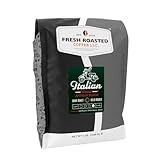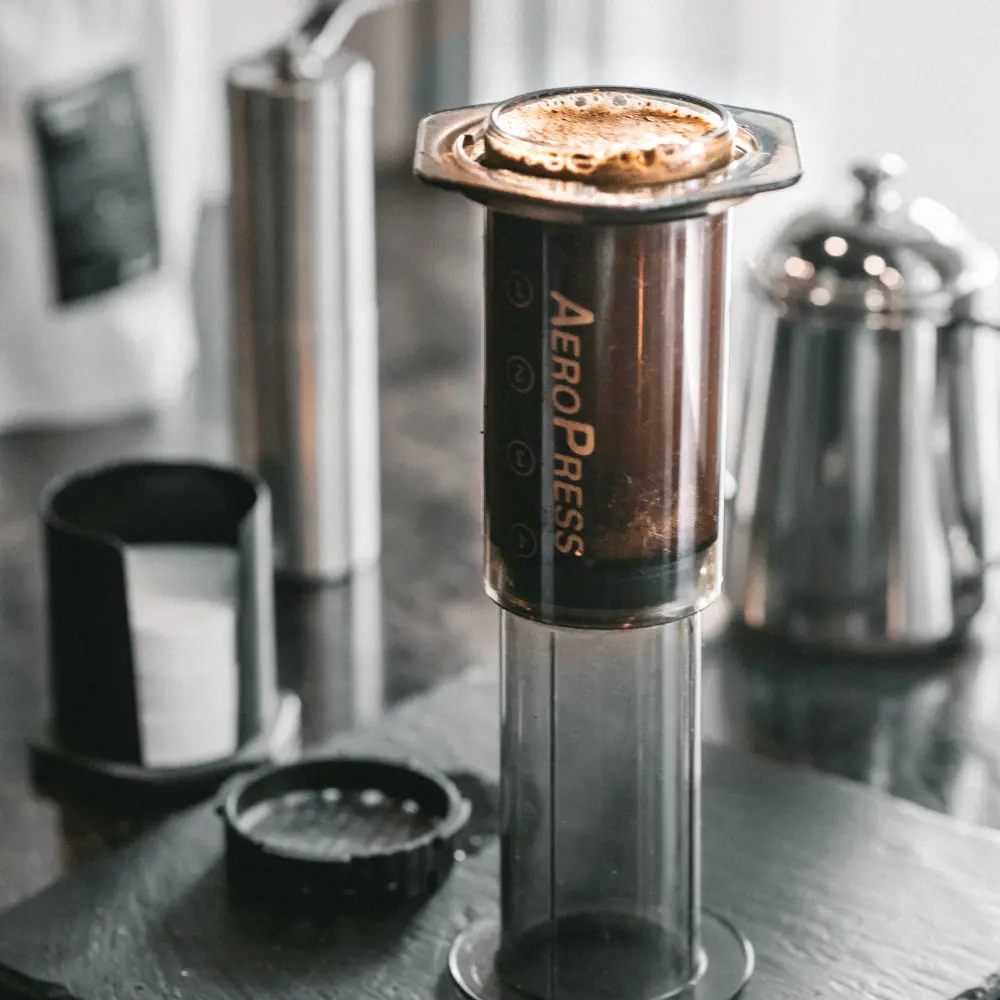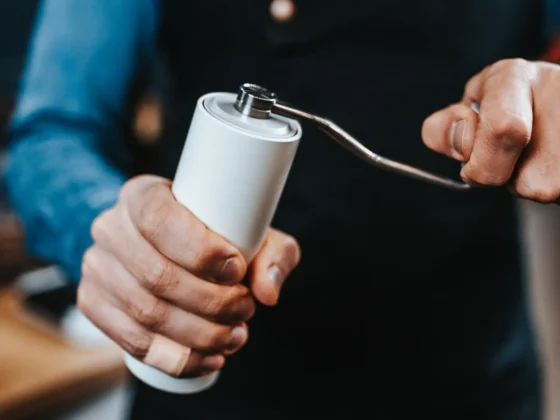In the diverse world of coffee, there lies a rich tapestry of flavors, aromas, and traditions waiting to be discovered. Among these, Mirra coffee, a specialty from the southeastern region of Turkey, particularly stands out. Its name, stemming from the Arabic term ‘mur,’ translates to bitter, which perfectly encapsulates its robust flavor profile. However, this unique beverage is not merely about taste—it carries centuries of history, cultural significance, and an elaborate brewing process. From the ancient plains of the Middle East to the bustling cities of the modern era, this delectable coffee has withstood the test of time, proudly holding its own in the evolving coffee landscape.
Join us on this flavorful journey as we delve into the rich tapestry of this coffee’s history and brewing mastery, shedding light on its origins, the nuances of its flavor, and the artistry behind its preparation. Whether you’re an Arabic coffee connoisseur or a curious coffee enthusiast, prepare to embark on an exciting exploration into the world of this delightful beverage. Get ready, as every sip promises a taste of tradition, a hint of heritage, and a new insight into this fascinating brew.
What is Mirra Coffee? – Key Takeaway
- Historical Significance: This coffee drink has deep roots in Middle Eastern culture and history, presenting a unique brewing process and serving rituals that date back centuries, making it much more than just a beverage, but a rich cultural tradition.
- Unique Brewing Process: The brewing technique for this beverage is distinct, involving a meticulous process of boiling, frothing, and cooling, often repeated several times. This method extracts robust flavors from coarser coffee grounds, contributing to its unique taste profile.
- Cultural Impact and Trends: This delectable coffee drink has made significant strides in world cuisine and continues to influence modern coffee culture globally. As the interest in specialty and traditional coffee grows, this coffee has a key role to play in shaping the future of the coffee industry.
- Health and Sustainability: Beyond its distinctive taste, this beverage may offer potential health benefits, particularly due to its high antioxidant content. Additionally, its production can promote ethical sourcing and sustainability practices, supporting local coffee producers and empowering communities.
- An Experience Beyond the Cup: Drinking this coffee concoction goes beyond savoring a robust, flavorful drink. It’s a unique experience that embraces a rich history, brewing artistry, and cultural significance. Whether it’s a simplified home version or the traditional method, brewing this coffee drink offers a journey into a unique coffee tradition.
The Origins and Historical Roots
From its beginnings in the southeastern region of Turkey to its cultural impact across the centuries, this drink tells a story that is deeply intertwined with the history and traditions of the Middle East. Let’s embark on a journey back in time to understand the roots of this distinct variant of Arabic coffee.
The Birthplace of Mirra Coffee: An Origin Story
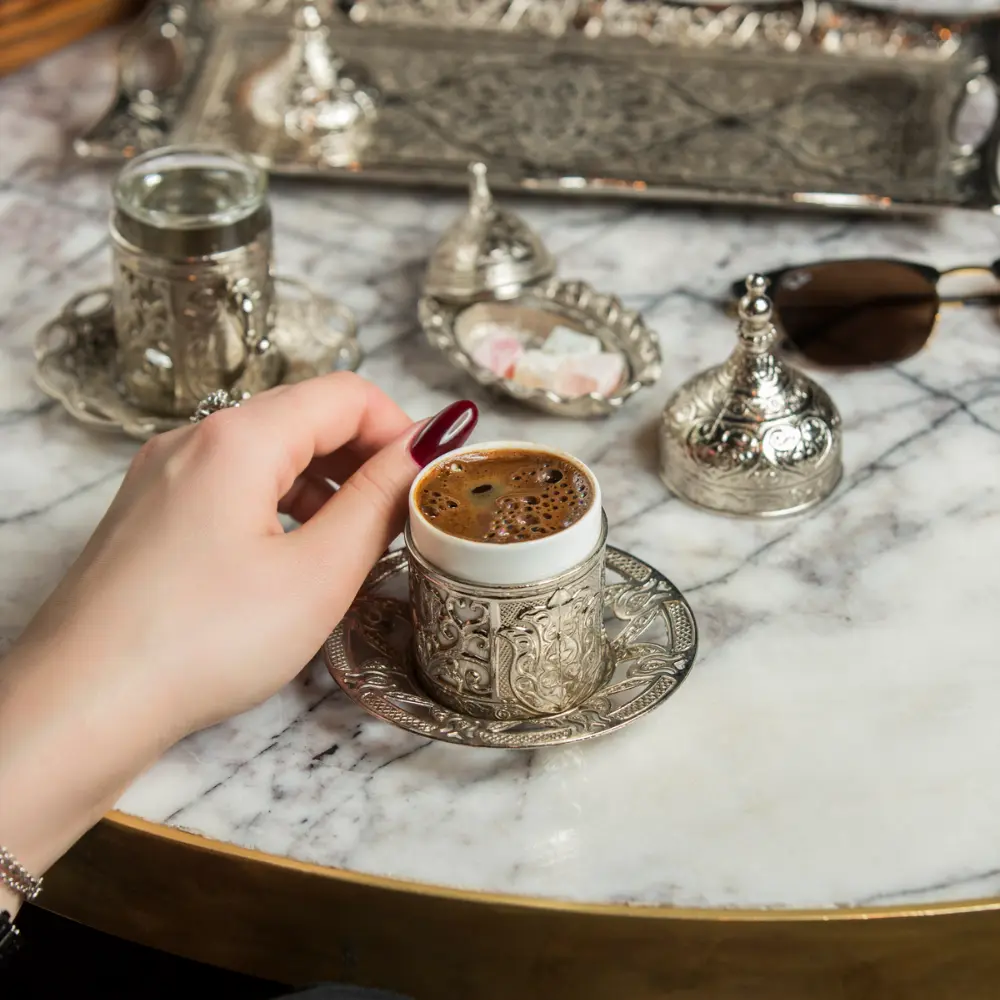
Mirra coffee, known for its strong and slightly bitter taste, finds its origin in the southeastern region of Turkey, more specifically in the ancient city of Urfa. The name ‘Mirra’ itself derives from the Arabic word “mur”, meaning bitter. (1) The coffee culture in this region is unlike anywhere else, deeply embedded into the fabric of daily life. Street vendors carrying samovars filled with a freshly brewed cup of this coffee is a common sight, indicative of the beverage’s ubiquity and significance in the region.
Mirra Coffee in History: Cultural Significance and Traditions
Throughout history, this coffee drink has held an esteemed place in the societal structures and customs of Urfa. It is a ceremonial beverage, served at significant life events such as weddings, circumcision celebrations, religious feast days, and in the homes of the bereaved when offering condolences. In wealthy households of the past, a special coffee maker was employed solely for the purpose of preparing this beverage for the family and their guests. This further underscores the respect and importance given to this unique variant of Arabic coffee in Urfa’s historical context.
Evolving with Times: Mirra Coffee from Ancient Times to Modern Era

This coffee’s legacy has not been confined to the annals of history. Instead, it has evolved and adapted to the changing times. While some traditional practices have remained intact, such as the ceremonial preparation and serving of coffee, modern conveniences have found their way into the process. Today, the traditional way of preparing this coffee drink, which involves slowly roasting and manually grinding the beans, has been partially replaced by coffee mills for convenience. However, it is noteworthy that coffee pounded in a traditional mortar is still considered superior.
Today, about twenty to thirty master coffee makers continue the age-old tradition of brewing this beverage in Urfa, often for special occasions. The trade passed down from father to son, is a living testament to the enduring legacy of this unique Arabic coffee variant. As we navigate the modern era, the story of this drink serves as a captivating reminder of the age-old traditions and rituals that continue to shape our present.
The Unique Flavor Profile of Mirra Coffee

When we speak of coffee, the conversation usually revolves around familiar variants like espresso, cappuccino, or latte. However, the world of coffee is as diverse as it is deep, with each region contributing its own unique flavor and brewing style. Tucked away in the southeastern region of Turkey is a coffee variety that’s steeped in tradition and rich in flavor – Mirra Coffee. Known for its robustness and unique brewing process, this concoction has captivated coffee enthusiasts with its rich coffee aroma, deep flavor, and the fascinating traditions that surround its preparation and consumption.
Taste of Tradition: What Makes This Coffee Unique

One of the aspects that make this coffee stand out is its intricate brewing process, which involves a series of steps carried out with utmost precision and care. Mırra is boiled repeatedly, yielding a dark, thick liquid. This careful roasting and grinding process creates a distinctive, robust flavor. True to its Arabic name “mur,” meaning bitter, Mırra boasts exceptional strength with a slight bitterness. Served in a copper cezve, the cup is filled halfway, passed to the guest who drinks it, returns the cup for a refill, and passes it to the next person. Each guest hands it back to the server when done, as per tradition. Otherwise, one must fill the cup with gold, marry or assist the server in marriage, or contribute to their dowry (for women).
Decoding Flavor Notes
Tasting this delectable drink is a rich experience that combines the senses of taste, smell, and sight. The coffee’s deep, dark color is reminiscent of molasses, hinting at the intensity of its flavor. The first sip greets your palate with an intense bitterness that quickly gives way to an underlying complexity, unveiling subtle undertones of toasted nuts or dark chocolate.
Its unique texture and consistency are the result of a rigorous brewing process involving repeated boiling and cooling stages. Occasionally, cardamom is added during brewing, which lends a hint of sweetness to balance the coffee’s robust bitterness and adds a layer of complexity to its flavor profile.
Coffee Pairings: What Goes Best with Mirra Coffee?

Serving this beverage is a ceremonious affair, typically enjoyed without any additives like sugar or cream to appreciate its pure, intense flavor. However, its strong and bitter taste makes it a perfect pair with sweet pastries or dates, which provide a lovely contrast and balance out its robustness. Savory snacks like cheese or cured meats can also be a great accompaniment, adding a different dimension to the tasting experience.
A word of caution for those not used to such potent coffee, Mirra is served in small quantities due to its high caffeine content. When drinking this coffee, remember it’s more than a beverage – it’s a tradition, a symbol of hospitality, and an opportunity to experience a unique and captivating facet of coffee culture.
Brewing the Perfect Cup of Mirra Coffee

The enticing experience of drinking a cup of joe is not just about the sip, but the entire brewing process. As with any specialty coffee, achieving the perfect cup of Mirra requires careful attention to the beans, the brew, and troubleshooting common brewing issues. Here, we explore each of these critical steps to brewing an exquisite cup of this rich and robust Arabic coffee.
Choosing Your Beans
When it comes to brewing an excellent Mirra Coffee, everything starts with the right coffee beans. The type of bean is less significant than the quality and freshness. Look for high-quality beans, sourced from reliable growers. Fresh beans are critical, as coffee beans start to lose their flavor soon after being roasted. For the most authentic experience, aim for Arabica beans, known for their superior quality and complex flavor profile.

Once you’ve sourced your beans, the roasting process is where the real magic happens. The beans need to be slow-roasted over low heat until they reach a specific color that indicates they are perfectly roasted. The master coffee maker can tell when the coffee is perfectly roasted by the color. It’s this care and attention to detail during the roasting process that contributes to the robust and bitter taste that defines this delectable coffee drink.
Traditional Brewing Techniques: Extracting the Best from Mirra Coffee

Brewing this coffee is a traditional process that requires meticulous attention to detail. The method described below is designed to preserve the rich heritage of this coffee while ensuring an exceptional taste. Please note, traditionally the brewing process requires at least three individuals: one to stir the water, one to pour the ground coffee, and another to recite ballads. However, you can adapt this method to a smaller group or even individual brewing if necessary.
Roasting the Coffee Beans
- Begin by roasting your chosen coffee beans. Good quality beans are a must, Arabica beans being the traditional choice for this beverage.
- Carefully roast the coffee beans in a spacious coffee pan, applying gentle heat. Stir the beans constantly using a long-handled spoon to ensure even roasting.
- Determine the completion of roasting by observing the color of the beans. Perfectly roasted beans are dark but not black.
Grinding the Coffee
- Once the beans are roasted, grind them in a large hardwood mortar until the grounds are slightly larger than what is typically used for ordinary Turkish Coffee. The grind size would be Finely ground. While coffee mills can offer convenience, the traditional method of using a mortar is considered to produce the best results. If you do not have a mortar, you can resort to a Burr coffee grinder.
Boiling the Coffee
- Begin the boiling process by slowly adding the ground coffee to boiling water in an ibrik or Dallah coffee pot. Traditionally, one person is designated for this task.
- Boil the coffee several times until a froth forms and the coffee becomes thick. This process requires careful attention to ensure the coffee does not boil over.
- After the coffee has achieved the right thickness and froth, add fresh water and some of the coffee mixture into a specially decorated metal pot, filling it halfway.
- Add more coffee, and bring the pot to a boil, placing it alternately in the heat and taking it away to avoid overflowing.
Separation Process
- Once boiled, let the coffee cool down so that the coffee grounds fall to the bottom of the pot.
- With great care, transfer the coffee into a separate pot called a mutbak, ensuring that the coffee grounds are left behind.
- Add more of the initial coffee and water mixture, and boil the coffee again.
- Repeat this process of boiling, cooling, and transferring to another pot until the coffee attains a consistency similar to molasses and a dark color that could stain a coffee cup. In the traditional practice, this ritual was repeated seven times while using a charcoal fire.
Adding Flavor
- At this stage, consider adding cardamom as a flavoring. This is optional and up to your personal taste.
Serving the Coffee
- When the moment for serving arrives, warm up the coffee using a long-handled coffee pot, commonly referred to as a cezve, or opt for a jug for the same purpose.
- Pour the heated coffee into cups. The pouring process also adheres to a ceremonial sequence: starting with the eldest and progressing to the youngest, each individual is served twice. Each cup is filled with a small amount of liquid at a time.
- It is crucial not to let the coffee get cold, as it loses flavor. Similarly, it shouldn’t be drunk so hot that it scalds the mouth. To fully appreciate the flavor, begin by allowing the coffee to lightly graze your palate before slowly sipping it in two or three delicate sips. As you indulge, gently rotate the cup 45 degrees with each sip.
- Do not add sugar. The strong flavor of this drink is traditionally enjoyed unsweetened.
As you follow these steps, remember the history and tradition that infuse every step of the process. (2) This will enhance your appreciation of the art and ceremony of brewing this coffee, and ultimately, the taste of this unique coffee experience.
Your At-Home Guide to Simplified Mirra Coffee Making
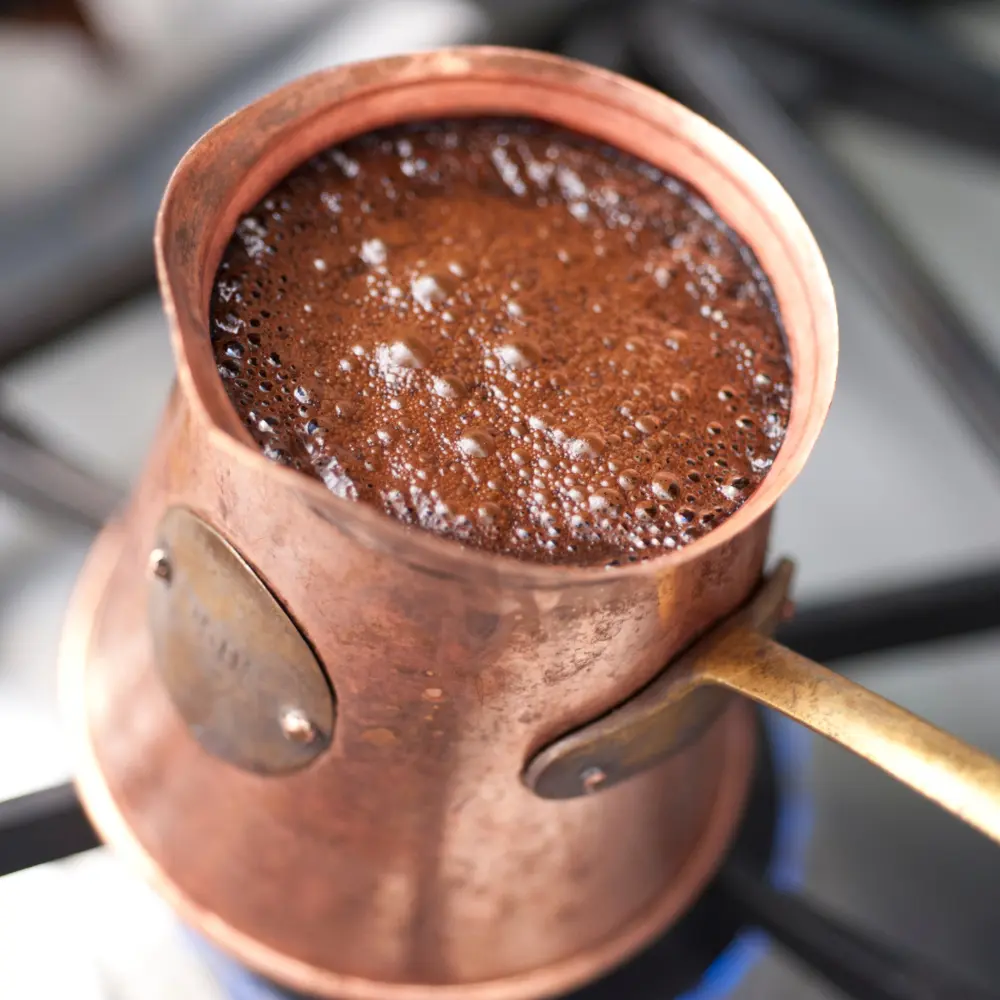
As we’ve seen, traditional Mirra Coffee preparation can be quite an elaborate affair, full of rich cultural customs and intricate steps. While we thoroughly appreciate this complex method, we also understand that it might be a bit overwhelming for someone new to this beverage. So, we’re presenting a streamlined, simplified version for the home barista.
Before we dive in, please keep in mind that this version retains the essential brewing steps of traditional Mirra Coffee, albeit with a few tweaks for convenience.
Step 1: Prep Time – Equip Yourself and Assemble Your Ingredients
This beverage brewing calls for certain unique items. Here’s what you’ll need:
- An Ibrik or Cezve (small pot with a long handle)
- 2 tbsp of finely-ground Arabica coffee (Italian roast, preferred)
- 1 tsp of ground cardamom
- 2 tsp of sugar (adjust to your liking)
- ¼ cup of water (at room temperature)
- A fine mesh sieve
- A small cup (preferably a demitasse)
Step 2: Concocting the Brew
- Pour the water into the Ibrik or Cezve.
- Add the cardamom and sugar to the water.
- Position the Ibrik coffee pot over medium-high heat, causing the mixture to simmer gently. Patience is key here – rushing might sacrifice the end flavor.
- When you notice the first signs of boiling, introduce the finely-ground coffee into the mix, avoiding any stirring.
- Let the coffee brew until it foams, then pull it from the heat. The foaming step is crucial as it helps extract the robust flavor from your coffee grounds.
- Once the foam recedes, put the Ibrik back onto the heat. Repeat this off-and-on method thrice, a technique that shapes this coffee’s distinctive taste.
Step 3: Serving with Flair
- Once the brew is ready, strain the coffee through the fine mesh sieve (optional but recommended for a smoother texture).
- Pour the brewed coffee into your demitasse cup.
- Now sit back and savor your homemade coffee!
The simplified version may not require an entire entourage or ballads, but it does create a delightful, strong brew perfect for pairing with dates or Middle Eastern sweets. Each cup captures a taste of tradition and a unique brewing experience, conveniently modified for your home kitchen.
- Stylish Design: The Mirra coffee cup set has a fancy and classy look, with a shiny white porcelain finish. The removable metal holders are as stylish as the cups themselves.
Troubleshooting Your Brew: Common Mirra Coffee Brewing Mistakes and Fixes
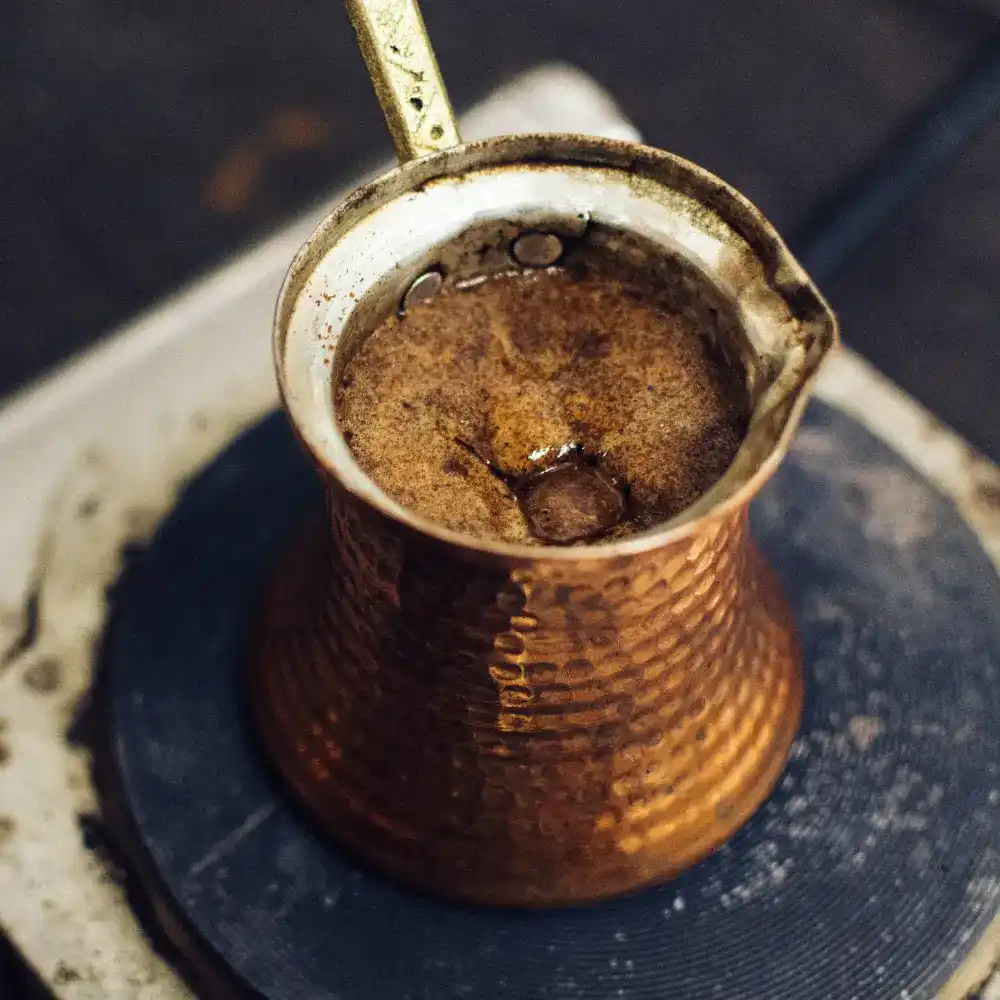
While brewing this beverage might seem daunting, understanding common pitfalls can help you navigate the process and ensure a successful brew.
- Over-roasting the beans: Over-roasting can cause the beans to become too bitter. To avoid this, closely monitor the color of the beans during the roasting process. They should achieve a dark brown color but not black.
- Incorrect grinding: The coffee beans should be ground until they’re slightly larger than for traditional Turkish coffee. Too fine a grind can result in a texture that’s too powdery.
- Not bringing to a proper boil: The coffee needs to be boiled multiple times to achieve the right consistency and flavor. Not doing so could result in a thin, weak brew. However, also remember not to over-boil, as this could lead to a burnt flavor.
Remember, brewing a perfect cup of joe takes practice. So, don’t be disheartened if your first few attempts aren’t perfect. With patience and attention to detail, you’ll soon be able to enjoy this traditional Arabic coffee in all its richness and complexity.
The Cultural Impact and Current Trends of Mirra Coffee

As we navigate the bustling world of coffee, it’s imperative to take a moment and appreciate how different brews from various regions have uniquely shaped our global coffee culture. One such brew that has significantly impacted the coffee landscape is Mirra Coffee, traditionally hailing from the Middle East. This strong, aromatic brew has influenced world cuisine, impacted modern coffee culture, and continues to evolve, promising exciting trends for the future.
Mirra Coffee in World Cuisine: Influence and Adaptation

This beverage’s distinctive brewing process and unique taste profile have left a significant imprint on world cuisine. Traditionally prepared with Arabic coffee beans, this coffee infuses a rich, robust flavor, distinctively enhanced by the occasional addition of spices like cardamom.
- Adoption Across Borders: this drink’s influence isn’t confined to the Middle East. Its unique preparation methods and flavor profile have found favor in various corners of the world, from North Africa to Eastern Europe. Particularly in countries with a rich history of coffee consumption, like Turkey, adaptations of this coffee are frequently found.
- Culinary Infusion: Besides being a beloved beverage, this coffee has found its way into culinary creations. Chefs around the world use it to enhance the flavor of desserts, sauces, and even meat marinades. Its rich, bold taste brings an exotic and sophisticated edge to a wide array of dishes.
Modern Coffee Culture: Role and Impact
This concoction’s impact extends far beyond culinary influences. It plays a crucial role in shaping the modern coffee culture as well.
- A Connection to Tradition: In a world where coffee consumption often revolves around convenience and speed, this coffee stands as a testament to the art of slow brewing. Its traditional preparation methods require patience and skill, providing a refreshing contrast to instant coffee and machine-automated espresso.
- Community and Conversation: This beverage’s traditional serving method, which involves serving coffee in small amounts over extended periods, encourages conversation and community bonding. This social aspect of coffee drinking is a significant part of modern coffee culture, echoed in the popularity of coffee shops as social spaces.
The Future of Mirra Coffee: Trends and Predictions
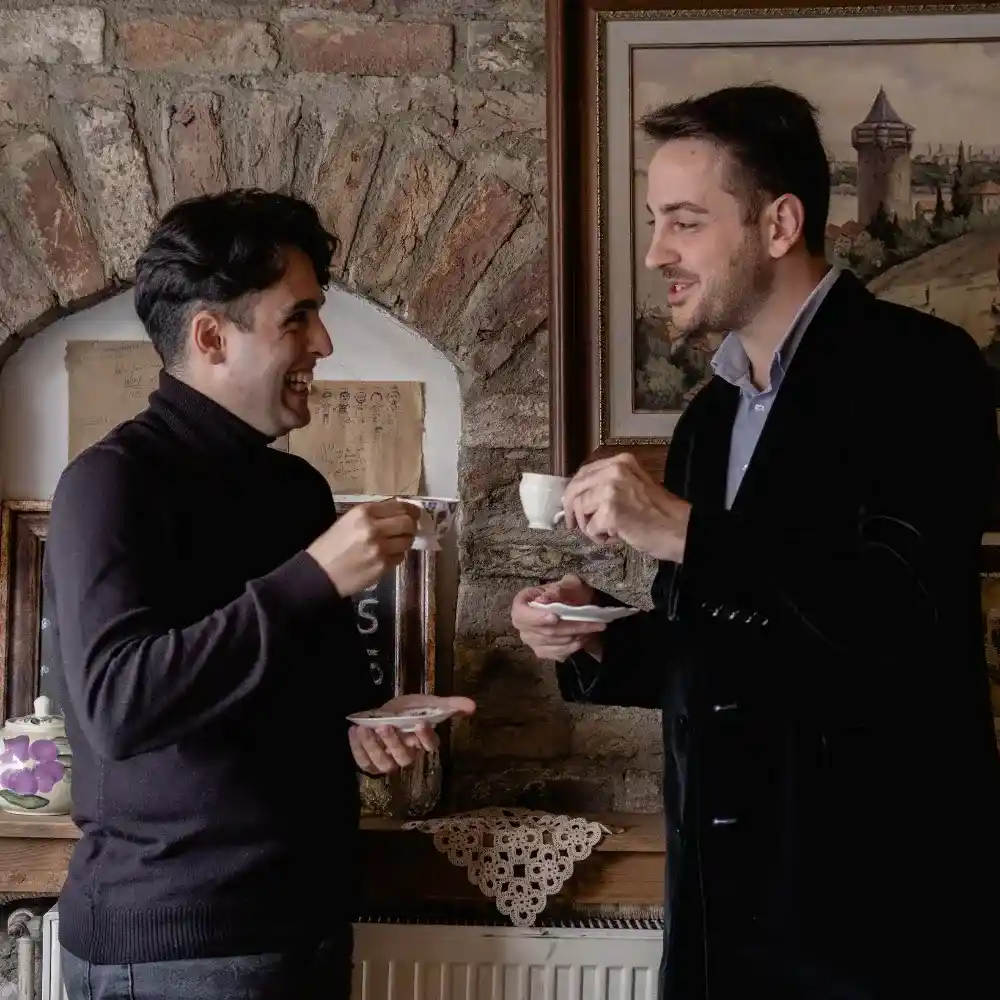
While this coffee is deeply rooted in tradition, it’s not impervious to the winds of change. As coffee culture continues to evolve, so does the role and presentation of Mirra Coffee.
- Innovation in Brewing: We are already seeing adaptations of the traditional Mirra brewing process to suit contemporary tastes and lifestyles. From home brewing techniques to commercial coffee makers incorporating Mirra into their menus, the future holds exciting innovations.
- Growth in Popularity: As global consumers seek out unique coffee experiences, we predict a surge in the popularity of this beverage. Its exotic flavors and rich history make it an attractive choice for coffee connoisseurs and novices alike.
- Sustainability Efforts: As with all coffee production, the future of this drink will also likely be shaped by sustainability efforts. Fairtrade practices, organic farming, and environmentally friendly packaging could all play a part in the future production and distribution of this drink.
To sum up, this lovely drink has left a profound impact on world cuisine and modern coffee culture. As we look to the future, it’s clear that this unique brew will continue to evolve, adapt, and enchant coffee lovers worldwide.
Health Benefits and Sustainability Aspects
Mirra coffee, with its distinct flavor and cultural significance, also contributes to the realms of health and sustainability. From potential health benefits to environmentally sound sourcing practices and empowering local communities, the narrative of this delightful coffee drink expands far beyond its taste.
The Health Benefits of Drinking Mirra Coffee

Just like its counterparts across the globe, this coffee can provide a variety of health benefits, when consumed in moderation.
- Rich in Antioxidants: Coffee, in general, is known to be a rich source of antioxidants. These substances can protect your cells against the effects of free radicals, potentially reducing the risk of certain diseases and promoting overall health.
- Boosts Mental Alertness: The caffeine present in this beverage can stimulate the central nervous system, helping to increase alertness and reduce the perception of fatigue.
- Potential Cardiovascular Benefits: Some studies suggest that moderate coffee consumption might be associated with a lower risk of heart disease. However, more research is needed to confirm this.
Please remember that, while coffee can offer certain health benefits, it is not a substitute for a balanced diet, regular exercise, and adequate rest. Always consult your healthcare provider for personalized advice.
Sourcing Ethically: The Sustainability Practices in Mirra Coffee Production
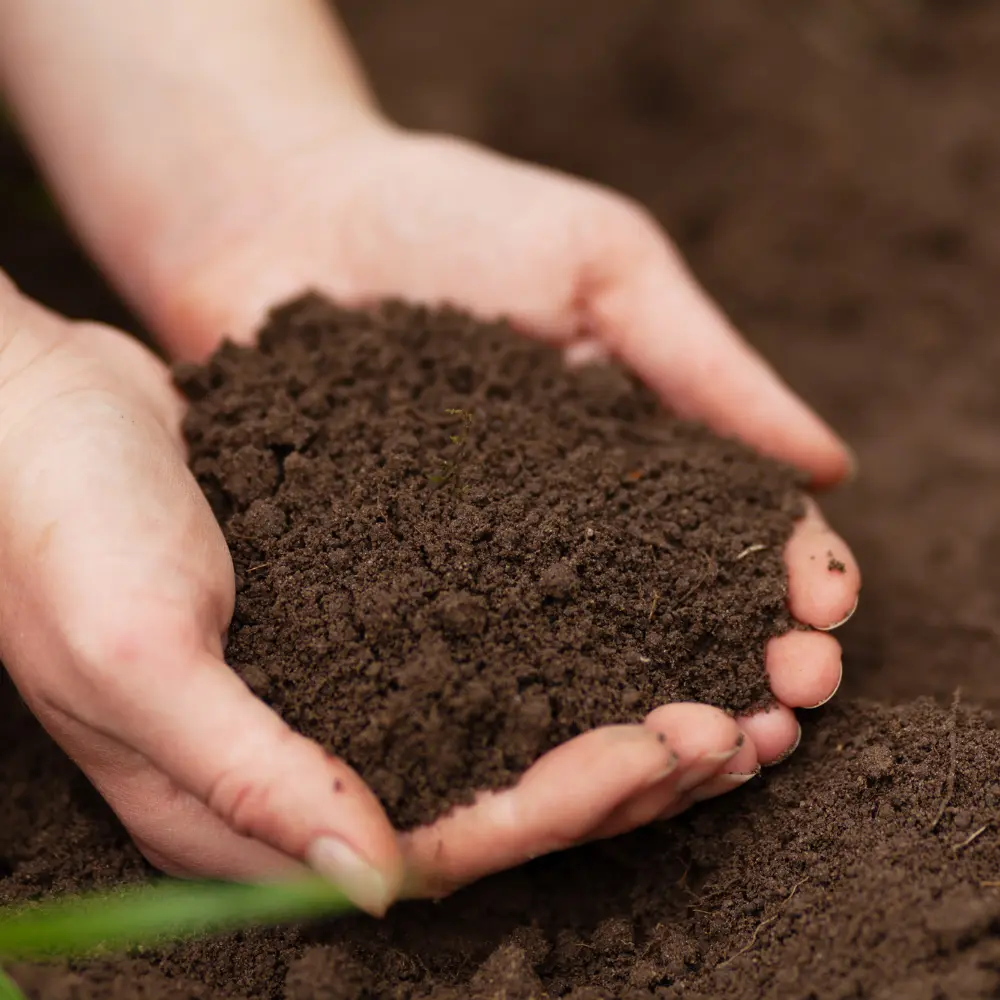
Ethical sourcing and sustainability are significant considerations in modern coffee production, and this coffee is no exception.
- Fair Trade Practices: Many Mirra coffee producers adhere to Fair Trade practices, ensuring farmers receive fair compensation for their work. This approach can contribute to a more equitable global coffee trade and promote better working conditions for farmers.
- Organic Farming Methods: By opting for organic farming methods, some producers avoid using synthetic fertilizers and pesticides. These practices can help protect local ecosystems and contribute to more sustainable agriculture.
As a consumer, you can support these sustainability efforts by choosing Mirra coffee from brands that prioritize ethical sourcing and environmental responsibility.
Supporting Local: How Choosing Mirra Coffee Can Empower Communities
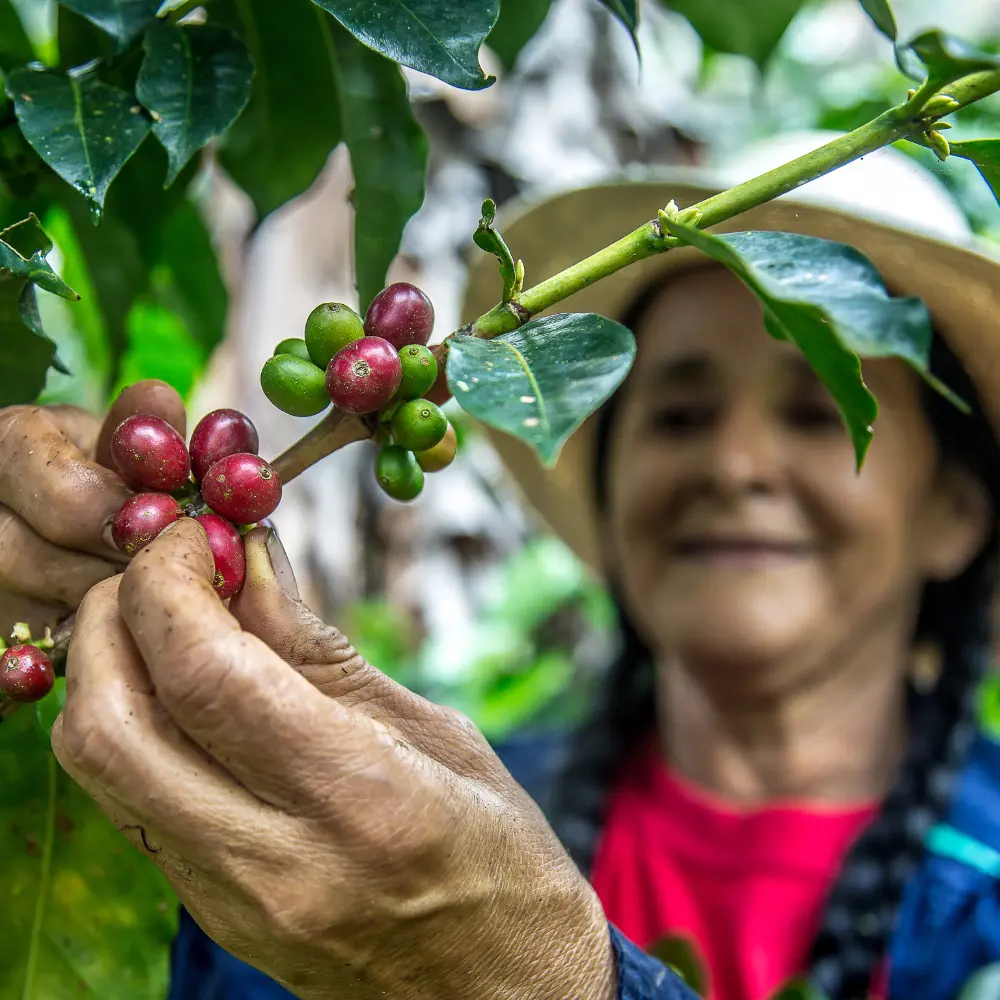
Choosing Mirra coffee doesn’t just provide you with a unique beverage experience; it can also help empower local communities.
- Supporting Local Economies: By purchasing this coffee, you’re supporting the livelihood of coffee farmers and workers in the areas where it’s traditionally grown. This economic activity can help strengthen local economies and improve living standards.
- Preserving Cultural Traditions: The production of this coffee involves traditional methods passed down through generations. By choosing this beverage, you’re helping to keep these cultural traditions alive.
Whether it’s the potential health benefits, the commitment to sustainable coffee production, or the support of local communities, there are plenty of reasons to enjoy a cup of this coffee. So why not brew a pot and savor not just the flavor, but also the rich tapestry of benefits it offers?
Conclusion
In conclusion, the story of this delectable coffee is a flavorful journey through history, culture, and brewing mastery that transcends the boundaries of a mere beverage. It is not just a unique version of Arabic coffee but is also a symbol of a rich cultural heritage that spans centuries. From its deep-rooted origins in the Middle East, through its specific and meticulous brewing techniques, to its current cultural influence and trends, this coffee remains a testament to the time-honored traditions that have been carefully preserved and passed down through generations.
Moreover, the potential health benefits, sustainability aspects, and impact on local communities add to the many reasons why this coffee continues to garner attention worldwide. As you enjoy your next cup of this coffee drink, remember that you’re not just savoring a delightful drink, but also participating in a long-standing tradition that celebrates history, culture, and the art of coffee brewing.
As the narrative of this concoction continues to evolve, it is, without a doubt, an exciting time for coffee lovers across the globe. So, whether you’re a seasoned coffee connoisseur or a curious novice, a cup of this coffee invites you to partake in a unique, flavorful, and deeply enriching experience. Here’s to the exploration of the extraordinary world of this delectable beverage, one sip at a time!
FAQ
How does the brewing process affect the taste of Mirra coffee?
The meticulous boiling, frothing, and cooling process used in brewing Mirra coffee extracts the robust flavors from coarser coffee grounds, leading to its distinctive, bold taste.
What role has Mirra coffee played in historical and modern coffee culture?
This beverage has played a pivotal role in shaping Middle Eastern coffee culture historically and continues to influence the global coffee scene, inspiring appreciation for traditional brewing techniques.
What are the health benefits of Mirra coffee?
The health benefits of this coffee drink may include high antioxidant content, potentially aiding in heart health, cognitive function, and combating oxidative stress.
How is the Mirra coffee industry contributing to sustainability and ethical sourcing?
The Mirra coffee industry promotes sustainability and ethical sourcing by encouraging traditional farming methods, providing fair wages to coffee farmers, and supporting local communities.






